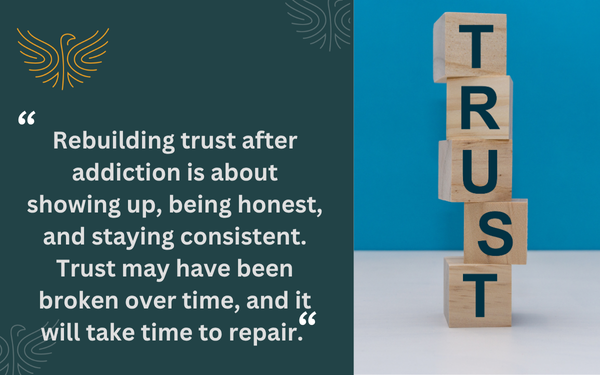If you’re reading this, likely, you’ve already taken one of the most courageous steps of your life—completing a rehabilitation program. It’s undeniable that this journey took strength, vulnerability, and commitment. But recovery doesn’t end when rehab does.
Reintegrating with daily life can leave you facing harsh realities, including trying to rebuild relationships and trust with those you love the most. After all, addiction doesn’t only impact the person with the substance abuse problem. It also spills over into family life, and your loved ones may still harbor hurt, confusion, and hesitation.
Ultimately, rebuilding trust takes time, patience, and consistent action. But it is possible. Below, we walk through some of the most effective ways to begin repairing those relationships. Keep reading to learn more.
_______________________________________________________
How to Build Trust in a Relationship After Addiction?
Rebuilding trust after addiction is about showing up, being honest, and staying consistent. Trust may have been broken over time, and it will take time to repair.

The good news, however, is that each small action you take can help lay a new foundation. With that in mind, here are some key steps to help rebuild trust with your family as you move forward in recovery and toward healing.
1. Maintain Commitment to Your Sobriety
Staying sober shows your family or loved ones that change isn’t just something you talk about; it’s something you’re living, day by day. It’s also a sign that your mind is healing and forming new, healthier patterns. But to your loved ones, it’s simple: it shows them that you’re serious.
And being serious about recovery isn’t just about staying away from substances. It means:
- Showing up for therapy and support group meetings, even on the hard days.
- Sticking to your treatment plan like you would with any life-saving medication.
- Using healthy coping tools daily, not just when things feel tough.
- Asking for help when you need it, instead of trying to white-knuckle it alone.
And keep in mind that getting additional treatment or returning to rehab isn’t a failure; it’s evidence of your commitment to protecting both your recovery and your relationships. Many successful people in recovery have multiple treatment episodes as part of their journey.
2. Take Small, Consistent Action
Trust rebuilds through accumulated evidence, not dramatic gestures. Additionally, the brain responds to consistent patterns, gradually updating its predictions about what to expect from you. Thus, small actions are always best and can lead to the most profound results.
Consider starting points, such as:
- Arriving on time for dinner.
- Calling when you say you will.
- Completing household tasks or chores without reminders.
- Remembering and acknowledging important family dates.
3. Respect Your Loved One’s Boundaries
Rebuilding trust means honoring the space your loved ones might need—even if it feels uncomfortable. They may not be ready to jump back into the relationship as it once was, and that’s okay.
Respecting their boundaries shows that you understand the impact of your past actions and are willing to meet them where they are, not where you wish they’d be. It’s another way to demonstrate growth, accountability, and care.
4. Be Honest
Honesty is the backbone of trust. During the throes of your addiction, there may have been lies, broken promises, or moments when your words didn’t match your actions. This history can make your family cautious, even when you’re doing everything right now.
Yet, it’s possible to rebuild trust through radical honesty—being truthful not just when it’s easy, but especially when it’s hard. This means being honest about how you’re feeling, admitting when you’re struggling, and taking responsibility for mistakes as they occur.
If you’re late, explain why. If you forgot something important, acknowledge it and make it right. These small moments of truth-telling help chip away at old doubts and create new evidence that you can be counted on.
It’s also important to be honest about your limits. Don’t make promises you can’t keep just to gain approval. Instead, be realistic about what you can do, and follow through. Over time, this kind of honesty builds a new version of you in your family’s eyes—one that’s dependable, grounded, and committed to change.
5. Make Amends
Whether or not you follow a 12-step program, the idea behind Step 9—making direct amends without causing further harm—applies to anyone in recovery. Making amends means:
- Taking full responsibility without excuses
- Acknowledging how your actions affected each family member
- Asking how you can make things right
- Taking real steps to repair the damage
- Showing change through consistent behavior
Sometimes, this means paying back money or replacing something that is broken. At other times, it means giving someone space when they ask. This step is important for repairing your relationships, as well as truly stepping into this new and improved version of you!
6. Keep Showing Up
As mentioned, rebuilding trust is a gradual process that unfolds over weeks, months, and sometimes years. But continuing to show up counts for a lot.
Be present, even when it feels awkward. Stay connected, even if things aren’t perfect. Trust grows through consistency. This also means committing to healthy communication. Listen without defensiveness. Speak honestly, but with kindness. Give space when it’s needed and lean in when the moment is right. You won’t always get it perfectly, but the effort matters more than you think.
As you rebuild relationships, prioritize your own mental health and respect the emotional needs of others. Everyone heals at their own pace, and it’s essential to allow that time.
And keep in mind, like any journey, rebuilding trust can be a nonlinear process. It’s okay to take five steps forward and two steps back. And it’s also important to acknowledge that some relationships may be beyond repair. This can be tough to admit, but refocusing on your commitment to sobriety and leaning on your support system, such as a sponsor and therapist, also counts for a lot.
At Freedom Recovery Centers (FRC), our team is here to help when times get tough. Whether it’s your first or last time in rehab, our team will walk you through the process step by step. Call us at 804-635-3746 or fill out our online form. Regaining trust in the relationships you cherish the most is possible, but you have to take care of yourself first.
.svg)






.svg)

.svg)



.svg)
